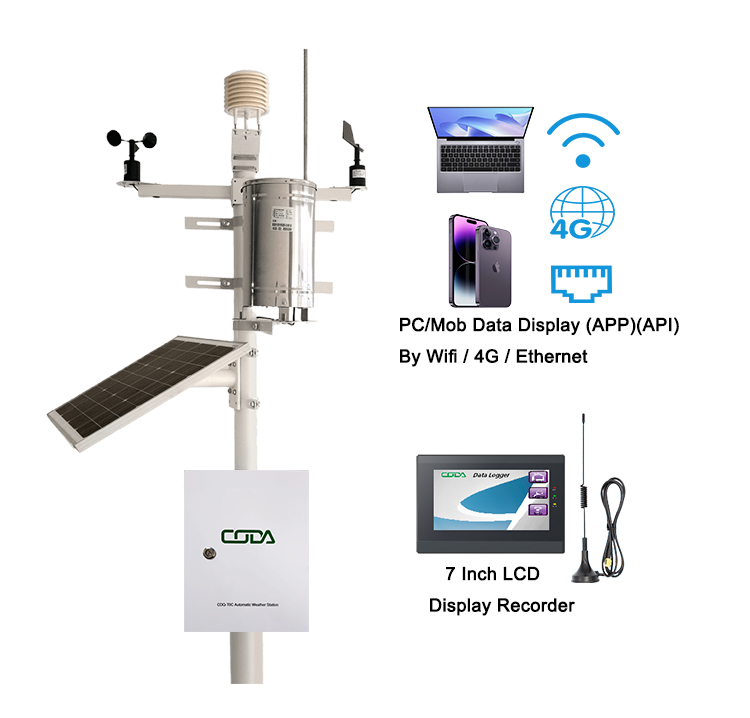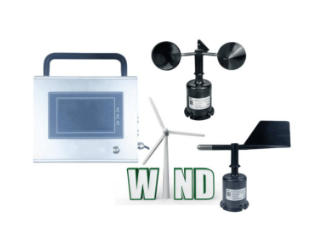Portable weather stations prove to be highly valuable for meteorologists, researchers, hobbyists, and professionals across various fields. These compact and adaptable tools furnish up-to-the-minute weather information, enabling informed decision-making and prioritization of safety. This article delves into the minutiae of weather stations, with a particular focus on portable ones, covering aspects such as their types, components, benefits, and potential limitations.

A portable weather station, as its name suggests, is a portable device designed to measure and record atmospheric conditions. With its portability, ease of use and high adaptability, it breaks the shackles of fixed locations of traditional weather stations, allowing people to easily access weather information wherever they need it. Whether it is mountains, lakes, seas, or urban countryside, as long as you need, portable weather stations can instantly become your eyes, insight into the mystery of the weather.
Portable weather stations can become the darling of many fields, can not be separated from its powerful functional support. It is like a precision instrument, accurately monitoring every subtle change in the atmosphere, providing indispensable data support for people's production and life.
CDQ-T1C Portable Automatic Weather Station
1. Wind speed monitoring: master the rhythm of wind:
Wind speed is an important parameter in meteorology. With a built-in anemometer (also known as an anemometer or wind wheel), portable weather stations are able to measure and record changes in wind speed in real time. These data are vital for aviv ation, navigation, outdoor sports and other fields, and are key to ensuring the safe and smooth running of activities.
2. Temperature measurement: Feel the natural temperature
Temperature is another key factor affecting human life and production activities. The high precision thermometer equipped with portable weather station can accurately measure and display the ambient temperature, which provides an important reference for agricultural planting, scientific research and health management. Whether it is hot summer or cold winter, it can accurately grasp the temperature change.
3. Humidity monitoring: Insight into the moisture of the air
Humidity, the amount of water vapor in the air, is important for predicting the weather, planning activities and ensuring human comfort. Through the humidity sensor, the portable weather station can monitor and record the ambient humidity in real time, helping you better understand the weather conditions and make more reasonable arrangements.
4. Barometric detection: Feel the pressure of the atmosphere
Barometric pressure is a complex and important parameter in meteorology, which is closely related to weather changes. Portable weather stations use barometers (also known as barometers) to measure changes in atmospheric pressure to help people predict weather changes, understand the impact of altitude on the environment, and more. Whether it's a mountaineering expedition or a daily trip, having information about air pressure can make your actions more leisurely.
5. Precipitation Measurement: Record tear drops in the sky
Precipitation is an important part of weather change, and it is also the focus of agricultural production, water resources management, flood control and disaster reduction. Portable weather stations with built-in rain gauges (also known as rain gauges or rain gauges) can accurately measure and record changes in precipitation, providing valuable data support for related fields.n.
Various types and characteristics of portable weather stations
With the development of science and technology and the diversification of demand, portable weather stations also show a diversified development trend. According to different application scenarios and needs, they are designed into a variety of different types and specifications to meet the individual needs of different users.
1. Handheld weather stations

Handheld weather stations are the most lightweight type, it is small, easy to carry, very suitable for outdoor adventure, tourism and personal interest enthusiasts.
Although the features are relatively simple, they are sufficient to meet basic weather monitoring needs.
2. Professional portable weather station
Professional portable weather stations pay more attention to the accuracy and comprehensiveness of data, and they are equipped with more sophisticated
sensors and data processing systems, which can monitor and record changes in a variety of meteorological parameters in real time. This type of weather station
is widely used in meteorological observation, scientific research, agricultural production and disaster prevention and reduction.
3. Intelligent portable weather station
With the development of Internet of Things technology, intelligent portable weather stations are gradually emerging. They not only have all the functions of
traditional weather stations, but also incorporate advanced technologies such as wireless communication, data analysis, and intelligent warning. Users only
need to view weather data, receive early warning information and perform data analysis anytime and anywhere through mobile APP or computer software,
which greatly improves the convenience and efficiency of use.
Advantages:
1. High portability: The biggest advantage of portable weather stations is their high portability, and users can carry and use them anytime and anywhere,
regardless of location and environment.
2. Powerful: Although small in size, the portable weather station has a variety of functions, which can monitor and record changes in a variety of meteorological
parameters in real time to meet the needs of different fields.
3. Easy to operate: Most portable weather stations have a user-friendly design concept that makes them easy to operate, even for beginners.
4. Accurate data: With the continuous progress of sensor technology, the data accuracy of portable weather stations has also been significantly improved,
which can meet the needs of various high-precision measurements.
Limitations:
1. Limited endurance: Due to the limitations of size and weight, the battery capacity of portable weather stations is relatively limited, and it is necessary to
charge or replace the battery regularly to maintain normal use.
2. Limited data processing capacity: Although some portable weather stations have data processing and analysis functions, they are still insufficient compared
to professional weather stations. The processing and analysis of large amounts of complex data still rely on external devices such as computers.
3. Greatly affected by the environment: portable weather stations are easily affected by environmental factors during use (such as temperature, humidity,
vibration, etc.), so corresponding protective measures need to be taken to ensure the accuracy of data and the stability of equipment.
To sum up, portable weather stations have won the favor and recognition of the market with their unique advantages and wide application scenarios. In the
future development, with the continuous progress of science and technology and the increasing diversification of people's needs, portable weather stations
will usher in a broader space for development and application prospects. Weather station exploration: Diverse choices and in-depth analysis in the market
Mushroom cultivation requires a carefully contro
In today's fast-evolving agricultural landscape,
Coffee bean cultivation is highly dependent on s
Contact: Molly
Phone: +86-17775769236
Tel: 86-0731-85117089
Email: molly@codasensor.com
Add: Building S5, Aux Square, Yuelu District, Changsha City, Hunan Province, China
We chat